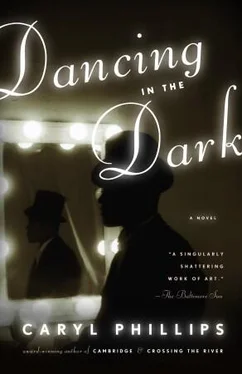Lying next to her he is filled with remorse. Ada, his wife. Dark star, dancer. Her small breasts are now no more than two stubborn buds that appear to be no longer either sensitive or inviting, and his stiff body stiffens further at her accidental touch, but he knows that her depressed soul has long ago learned to live with this hurt. Lying uncomfortably next to his wife he knows that in a few hours he will witness light filtering through the thin drapes as dawn breaks and the gloomy shadows will start inevitably to define themselves; first the wardrobe, then the chair, then the chest of drawers. Ada. Dark star by which he set a false course.
Prejudice means that, of course, we can never fall in love or have a romance at the center of our Williams and Walker productions. It is all too easy for a colored show to offend a white audience so instead we pretend that we have no such emotions, and we are all guilty of this pretense, all of us. We accept that the remotest suspicion of a love story will condemn us to ridicule, but my husband, Mr. George Walker, he is trying to change this situation and I am right behind him in his efforts. There are ten thousand things we must think of every time we make a step and I am not sure that the public is fully aware of the limitations which other persons have made on us.
AIDA WALKER
Those shaded show girls are led by Aida Walker who used to be Ada Overton. Is the change from “Ady” to “I-e-da” meant to mark a musical advance by Williams and Walker from Negro melody to operatic music? Aida is a lively lightweight, impish, sprightly, and coquettish. Her complexion is half-tone and her hair hesitates between Marcel waves and Afric kinks.
PHILADELPHIA INQUIRER
KINKY
Introduced by Aida Overton Walker
Kinky, Kinky your skin is kind o’ inky,
But I love you I do,
Shady maybe but a perfect lady
Ev’ry inch of you
Kinky, Kinky there’s a little dinky hut
Just built for us two,
Tarry, marry and it’s there I’ll carry you my Kinky True.
True.
Having settled their dispute with their former promoter, George stands on a simple wooden chair and addresses the company. His gestures are neat and confident and he punches the air to make his points. Bert looks up at his partner and realizes that George is committed to every word that he is saying. George believes that they are about to change American theater. He believes that Abyssinia will be ten times the success that In Dahomey was. He believes that the day has come for the Negro to storm the American stage and stake his claim to a position of equality alongside his fellow white performers. He believes that Williams and Walker are giving America both culture and history, and the introduction of Americanized African songs is helping to begin this process of moving away from the old darky stereotype. Slouch Negroes are no longer acceptable. Hell, I ain’t nobody’s uncle, and I ain’t called Tom, cries his partner. George believes, but Bert wonders why George has chosen not to speak with him about his beliefs.
All that was expected of a colored performer was singing and dancing and a little storytelling ….[White per-formers] used to make themselves look as ridiculous as they could when portraying a “darky” character. In their “make up” they always had tremendously big red lips and their costumes were frightfully exaggerated. The one fatal result of this to the colored performers was that they imitated the white performers in their make-up as “darkies.” Nothing seemed more absurd than to see a colored man making himself ridiculous in order to portray himself.
GEORGE WALKER
George moves toward the conclusion of his speech now, taking them through their own history. Farewell, Tambo and Bones, white men with blackened faces acting out their fantasy of the colored race. Farewell, Jim Dandy, drunken creature of impulse, dancing wildly, putting on airs, racially incapable of self-control. Farewell the forlorn-looking indulgent black, with gross lips, and eyes and legs that move independently of each other. No more “Ethiopian Delineators,” “Sons of Momus,” or “Happy Plantation Darkies.” George insists that In Dahomey has carried them far beyond this, far beyond tambourines and banjos. George insists that they are performers, they are artists, and he expects them to carry themselves as such, and behave with the dignity that is their calling at this point in their history. George insists that America expects.
Later, when the company has dispersed, Bert resolves to remind his partner that indeed they are performers, but it is the paying audience, and not George’s mythical America, that expects. Mr. Booker T. Washington and Mr. W. E. B. DuBois exist for the purposes of agitation and revolution for the colored race, but Mr. Bert Williams and Mr. George Walker are entertainers, and they have to respect the conventions of the time or face the consequences. It is right and proper that Williams and Walker should develop progressive new material and new dances, but they should also remember that there are many others who are eager to take their place. Too much fighting talk is not going to help anybody, and have not things already improved? They are not doing buck and wing dances or breakdowns anymore, and they are slowly cakewalking their way into history with a talent that has been seared and trained for the stage. He will remind George that it is through hard work and application that Mr. Bert Williams has developed his timing to the point where he knows how to delay and hold back. The audience may think they are watching a powerless man but they are, in fact, watching art. We must understand how to make them feel safe, George. We must see the line. We cross that line, George, then who is going to pay to see us? They feel safe watching a supposedly powerless man playing an even more powerless thing. Williams and Walker have to respect this and simply strive to be the center of laughter, not the object of it. In time an alternative to the counterfeit colored culture that besmirches our stage will emerge, but only in time. Right now nobody will pay to see the colored man be himself, so we must tread carefully. This kind of talk is not going to help anybody, George. It’s just feel-good talk for the company, nothing more to it than that. Later, when the company has dispersed, Bert will remind his partner of the reality of the situation.
This may sound snobbish, though it isn’t; I’m not a native of the United States, but a West Indian, and I must take solace from my philosophy so long as I can earn my livelihood in this country. The rebellion is all out of me, for I know that it is up to me, and that this is the only civilization in the world where a man’s color makes a difference, other matters being regarded as equal. You must admit that there’s food for thought, not necessarily bitter, in the fact that in London I may sit in open lodge with a premier of Great Britain, and be entertained in the home of a distinguished novelist, while here in the United States, which fought four years for a certain principle, I am often treated with an air of personal condescension by the gentleman who sweeps out my dressing room, or the gentleman whose duty it is to turn the spot light on me, if the stage directions call upon him to do.
BERT WILLIAMS
But after Bert diplomatically reminds an unusually quiet George of the reality of the situation as he sees it, he asks his silent friend to help him figure out another question. George, you ever ask yourself why a white man would want to blacken his face with cork, dress down a point or two beneath the lowest of his race, and jig and dance around and pretend he’s a colored man? I mean, try and walk like him, talk like him, make gestures, laugh, strike poses, behave just like how he imagines a colored man does. The fact is they do not like us, George, and they choose not to eat, drink, or live with colored folks, yet they must have some part of themselves that wants to be like us. But not like us truly, but some approximation of us; a strange creature of boundless appetite that they imagine to be us. Tell me, George, why do they want to be like us? But George is still thinking about something else.
Читать дальше












